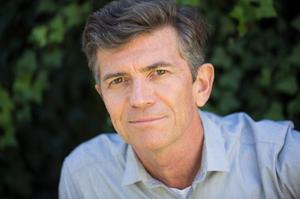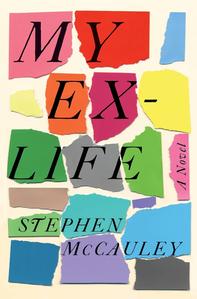
|
|
| photo: Sharona Jacobs | |
Stephen McCauley has written six previous novels, including three that were made into movies. His latest novel, My Ex-Life (Flatiron Books, $25.99), is a witty, insightful story about David, a gay man who reunites with his ex-wife, Julie. McCauley lives in Massachusetts and co-directs the creative writing program at Brandeis University.
The relationship between David and Julie is an unusual one. How did you come up with this idea?
There's always been something interesting to me about the idea of exes reconnecting later in life. The combination of familiarity and new context appeals to my desire for stability in my own life as well as new experiences. As I get older, I appreciate more the value of having a history with someone, and I wanted to explore that. I love writing about friendships that border on love and, in this case, given that David is gay and they've already had this history together, they each know this is not going to turn into a romantic relationship. That gives it a layer of melancholy that I find sweet, mixed in with love and friendship.
The bottom line is that when people have been together for a very long time, in any configuration, what is important to them changes. The fiery passion that maybe ignited the beginning of a long-term relationship isn't there anymore, but the friendship and companionship remain. That's what each of these two characters is looking for--some stability, some kind of home that they can make.
What is your writing process?
I need to go somewhere new and be out of my home environment in order to write. I research towns not too far from home and rent a place. The town needs to have a good public library, a place to get espresso and some yoga studios. I spend my time in the library writing. When I go someplace I am renting, there's no reason for me to be there except to write.
For a long time, I worked very slowly. If I couldn't get something right, I couldn't move forward, and it was a grueling process. With My Ex-Life, after the first 120 pages or so, I wrote the rest of the book completely out of sequence. I would just think, "Okay, what's a scene that you can imagine between David and Mandy [Julie's daughter]?" and then I would write it. I didn't know where it would fit into the bigger story. I did that for the last 250 pages of the novel, and I ended up with all these individual scenes that I catalogued and kept reshuffling and putting together. Once I figured out what order they went in, I edited them so they would accommodate the story. It's a less efficient process, but it's a more freeing feeling, and I really enjoyed it. In the novel, Mandy is said to be "good at reading people." Your writing shows the same talent, with insights into the motivations and underpinnings of characters. Where do your insights come from?
In the novel, Mandy is said to be "good at reading people." Your writing shows the same talent, with insights into the motivations and underpinnings of characters. Where do your insights come from?
The honest answer is that you just make stuff up and hope that it sounds accurate and truthful! For most of my life, I've been a shy and somewhat introverted person, though less so after 30 years of teaching. The value of that for a writer is when you are sitting there and not saying much, you are observing what's going on and making mental notes.
As a reader, I'm not that into complicated, exciting plots. My greatest pleasure is reading about insights into people and characters and their motivations. I love writers like Anita Brookner. Her books have minimal plot but brilliant insights into the minds of the characters and analysis of their small gestures and actions. That's what appeals to me as a reader, and it's what I strive for to some degree in my own work.
There are many lines in the novel that cut to the heart of something while also making the reader laugh out loud. How do you combine insight and humor so seamlessly?
I'm always a bit worried that I'm pushing things too far into the realm of cartoon. When you're writing what you intend to be a comic voice, there's a delicate balance. You need a little bit of exaggeration--not only in portrayals of people and some of the scenes but also in certain lines--but if it isn't rooted in some recognizable truth, then it isn’t funny. The challenge is to observe something about people and relationships and motivations that has some element of truth in it and then to phrase it in a way that has a comic element.
Your first novel, The Objection of My Affection, was the thesis you wrote for your MFA, which was quickly sold to a publisher and then for a movie adaptation. What was your reaction to that quick success?
I was pretty shocked. I went to the Columbia MFA program in the 1980s, and I had a lot of classmates who went on to be very successful writers, but I just assumed that my work would never see the light of day. It had a gay narrator, which, in the mid-'80s, was less common than it is now. I was shocked by the fact that it got published and then that it did reasonably well.
It was a wonderful and life-changing experience for me. The book got some nice attention, and then there was movie interest. When the book came out, I was working at a travel agency, which was what I had been doing before the MFA program, and I fully expected that I would end up doing that indefinitely. It was a very welcome and surprising different direction my life took. --Suzan L. Jackson, freelance writer and author of Book By Book blog

